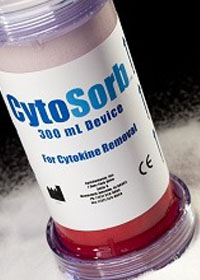 CytoSorbents has filed an investigational device exemption (IDE) application to gain US Food and Drug Administration (FDA) approval to conduct the clinical study—Safe and timely antithrombotic removal–direct oral anticoagulants (STAR-D)—in the USA to support FDA marketing approval for DrugSorb-ATR antithrombotic removal system.
CytoSorbents has filed an investigational device exemption (IDE) application to gain US Food and Drug Administration (FDA) approval to conduct the clinical study—Safe and timely antithrombotic removal–direct oral anticoagulants (STAR-D)—in the USA to support FDA marketing approval for DrugSorb-ATR antithrombotic removal system.
This is being performed under the previously announced FDA Breakthrough Device Designation granted to DrugSorb-ATR for the removal of apixaban and rivaroxaban in a cardiopulmonary bypass circuit to reduce the likelihood of serious perioperative bleeding in urgent cardiothoracic surgery.
Efthymios N Deliargyris, chief medical officer of CytoSorbents stated: “The investigational plan set forth in this IDE filing comes approximately one month after the FDA granted breakthrough designation for this application, demonstrating the operational efficiencies of our clinical and regulatory teams and the leveraged synergies with the previously approved and currently active US STAR-T pivotal trial to remove ticagrelor during urgent cardiothoracic surgery.
“We expect discussions with FDA on the current IDE application to conclude in the fourth quarter of 2021 and if approved, plan to commence study initiation activities for this second DrugSorb-ATR trial immediately thereafter. We plan to provide more details on the STAR-D trial, designed to support US FDA marketing approval for this additional application, in the near future.”
In August 2021, the FDA granted CytoSorbents breakthrough device designation to remove the direct oral anticoagulants (DOACs) apixaban and rivaroxaban to reduce the risk of serious bleeding during urgent cardiothoracic surgery, recognising this unmet medical need.
Apixaban (Eliquis, Bristol Myers Squibb/Pfizer) and rivaroxaban (Xarelto, Jansen/Bayer) are two of the most commonly prescribed anticoagulants worldwide, including more than 5 million patients annually in the USA who are chronically on these medications to reduce the risk of deadly blood clots due to atrial fibrillation (AF), prior history of heart attack or stroke, deep vein thrombosis, pulmonary embolism, and peripheral artery disease.












